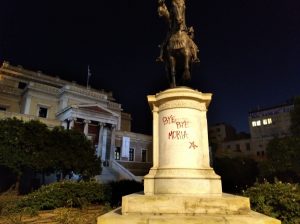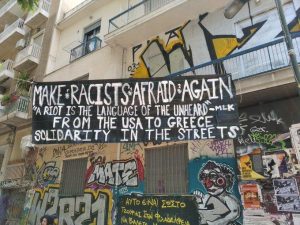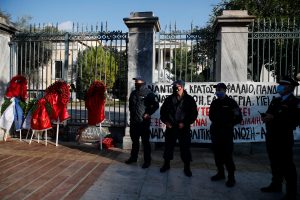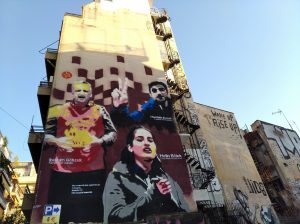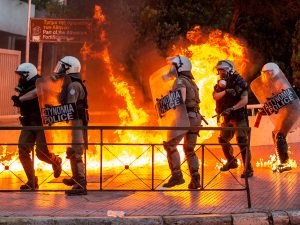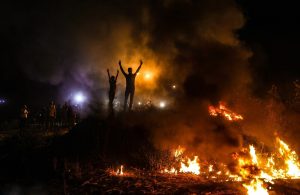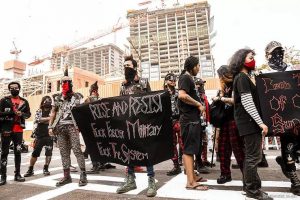
Report on Deutsch, Español, Français & Italiano
At this time, we are reminded of our comrades through banners and graffiti, through brief encounters under the guise of getting exercise between curfews, and through the courageous actions of those who turn to the night to act as the day becomes too dangerous.
The anarchist movement in Greece is among the largest in the world, proportionate to the population. However, we are now experiencing unprecedented repression as a result of the pandemic and resulting political opportunism. We remain stagnated in lockdown, overwhelmed by the reign of the right and its defenders. Ecocide, social control, new crackdowns on universities, and general repression of those excluded from or deemed enemies of the Greek state continue to expand in the shadow of COVID-19.
We will highlight a few recent incidents of concern relating to the solidarity efforts essential for the global anarchist movement. We sometimes struggle to write these updates, not wishing to simply present a monthly bulletin on depression from Greece. We write from a perspective that many people here share, best summarized by this comment that captures the theme of so many interactions here: “Some days good, some days bad. Just feel stuck, and not even sure what I’m waiting for.”
During this enforced pause in our lives, those who hold power are rushing through policies and automation disguised as pandemic response. This is part of a broader effort to gentrify Greek society.
But don’t doubt for a moment that there is a broader tension growing here—whenever the state is forced to ease lockdown, people will awaken, broke and tired, and anger will be everywhere!
This is expanded from Radio Fragmata’s contribution to the Bad News report. You can read our reports from May, June, July, August, September, October, and December.
Refugee Crisis Continues, Compounded by the Coronavirus
Refugees and migrants still awaiting asylum and papers now face an ever more dangerous situation as COVID-19 threatens them and the notorious Greek bureaucracy keeps them in the cold, both metaphorically and literally, in refugee camps across the country. The situation has not changed since our prior report; if anything, it has worsened through the winter.
This is an ongoing tragedy. Greece is testing the limits regarding how low the European Union standards for refugees and immigrants can be pushed. The inevitable looming influx of refugees fleeing the ripple effects of lockdowns around the world will end up in these deteriorating conditions. Additionally, the xenophobic programs in which Greek nationalists have been attacking refugees and anyone who supports them will likely be expanded via informal collaboration with nationalists in other countries likely to be future destinations for refugees such as Malta, Spain, and Italy.
COVID-19
The government spent a million euros on Christmas decorations, while people are given peanuts to wait out the lockdown. The Greek state’s failures and opportunism during the pandemic have even caught the attention of mainstream press, with Bloomberg placing Greece 50th out of 53 countries with a GDP of over 200 billion dollars in terms of COVID-19 management.
This ranking for COVID-19 “resilience” is determined by weighing the extent of lockdown measures against the infection rate, economic consequences, and quality of life. For comparison, while the US clearly represents an extreme situation regarding death rates, the rates are aligned with the Trump administration’s refusal of any type of national lockdown or mask mandate. By contrast, Greece is experiencing one of the most stringent lockdowns in the Western world, yet the infection rate remains high compared to countries taking similar measures. Rampant double standards and circumstantial suspension of the measures point to the conclusion that the Greek government is exclusively concerned with pushing self-interested policies rather then mitigating medical and humanitarian crises.
For example, the government is permitting churches to remain open to appease its far-right base, lifted restrictions for people to purchase products leading up to Christmas, and is now going all-in to collaborate with biased media to blame ordinary people for the spike in infection rates.

Cops Everywhere, ICUs Nowhere
The lockdowns have also been militarized, especially in the poorer regions to the west of Athens and in the treatment of Roma communities across the country. Soldiers in armored vehicles enforce intensive lockdowns in these regions characterized by poverty, migrant labor, and Roma populations. It is no coincidence that the rebellious neighborhood of Exarchia and Roma communities outside the center of Athens are targeted with especially strict lockdowns, while in wealthy suburbs and neighborhoods like Athens’ Colonaki, groups gather outside coffee shops, people move freely without fear of being detained, and upscale business owners use a loophole intended for essential workers to make papers that permit their friends to hang out with them in bars and restaurants that are open for take away. It is truly dystopian when a boss’s signature is the next best justification for being out after curfew to a dog that needs walking.
Police gather in groups without masks; they stop nighttime medical and delivery workers out of sheer boredom, fingering their papers, searching them, spreading the virus in the name of prevention. If this isn’t enough entertainment, they turn to abusing homeless people. Even Politico, a corporate media source, has begun to cover the police abuse and political opportunism New Democracy has introduced during the pandemic.

The Sixth of December
On December 6, 2008, in Athens, Greece, police murdered 15-year-old anarchist Alexandros Grigoropoulos in the neighborhood of Exarchia. In response, anarchists, young people, and other rebels from targeted populations rose in revolt, organizing countrywide riots and occupations that lasted for weeks. It has been an important anniversary ever since.
Much like the 17th of November, December 6, 2020 saw an assault on our movements under the excuse of pandemic precautions. Police set up a perimeter around the neighborhood of Exarchia the day of the 6th, and an additional interior perimeter of extra security was set up directly around the memorial to Alexis Grigoropolous, blatantly disrespecting his memory. Police responded to elderly supporters’ peaceful attempts to leave flowers at the memorial with threats of violence; in one instance caught on video, a MAT officer is seen taking flowers and smashing them before dropping them on the street. Every attempt to march was attacked. Greek police made over a hundred arrests throughout the day. Despite this, in defiance of the draconian measures enforced by the state, people courageously participated in marches and demonstrations to recognize the memory of Alexis and the insurrection that followed his murder in December 2008.
Shortly before December 6, a group attempted to hold a banner in memory of Alexis in front of the parliament building in Athens, only to be attacked by delta police and tear gas. On the day of the 6th, another small group attempted to hold a banner and chant in Exarchia. Police attacked them as well, throwing a flash-bang canister directly inside a building at some of them, which is extremely dangerous. Small marches faced similar responses across the country from Crete to Northern Greece as the state sought to suppress this defiant tradition. Still, autonomous marches took place outside the center of Athens and throughout Greece while banner drops and graffiti across the country asserted our passion for freedom.
A group—allegedly involving eighty people—attacked a police station in Colonos, Athens on December 6, sending a few officers to the hospital for minor injuries. Police arrested one individual, who faces felony charges; fortunately, she has been released pending trial. The following day, at the memorial of Alexis in Athens, about 100 people held banners, chanted, and laid flowers and candles. Riot police attacked the march shortly after it began, dispersing people throughout Exarchia, but leaving a group of about 40 stuck inside a building surrounded on all sides by police. Fortunately—likely fearing reprisals for the brutality they had inflicted the previous day, and because nearby press were watching—the police allowed the group to leave unmolested.
Despite the brutality and repression on the 6th, they were unable to drown our voices, nor suppress the memory of Alexis. Our passion for freedom is more sincere than the mercenary mentality of those who serve the state and the ruling class. Every expression of celebration and rebellion, however big or small, was an act of courage at a time when simply leaving home involves risk. It was a hard and sad day in many ways, but no matter how intense the state’s repression grows, we will never forfeit our revolutionary convictions, never forget those who have been murdered or imprisoned, never forgive those responsible. Alexis lives on in our hearts and actions.

Repression
On December 6, a comrade from France known as Errol was also arrested. He had already been arrested repeatedly at various actions; however, this time, he was taken to the Petroralli detention facility as an immigrant, even though he is a citizen in the European Union. Initiating deportation proceedings against an anarchist like this is an unprecedented act—regardless of whether we care about the law, it is noteworthy that it is illegal according to EU policy. A few days later, without trial or notice, Errol was deported to France. Solidarity efforts, actions, and graffiti continue across the country, but the lengths to which the Greek state will go to send a message to non-Greeks in the movement is alarming.
From a statement by the solidarity assembly with anarchist comrade Errol:
The arrest of Errol signifies a new repressive escalation from the state, demonstrating that prosecution for misdemeanors can lead to the imprisonment and the deportation of political subjects. The state of paralysis and decimation of the social resistance must break and the struggle for the cessation of the prosecution of our comrade is another step towards this direction.

Eight people currently face felony charges for an action against the dean of the economics school, the one responsible for evicting a local social center and the squat Vancouver. A campaign to support the humiliated dean mobilized New Democracy supporters who were shocked to see a white man humiliated by being compelled to wear a sign that said “solidarity to the squats.” They offered a reward of a hundred thousand euros for information on who might be responsible—a considerable figure, especially in the midst of an economic crisis. The police have rounded up people at random, with very little evidence apart from claiming that they have connections to the movement. Regardless, the charges are very significant and a long-term support and anti-repression campaign is likely to follow. Please refer to this link for ways to donate, support, learn about the case, and show solidarity.
Prison Conditions
Prisoners remain defiant across the country amid continued degraded hygiene and conditions that leave many at risk of contracting COVID-19. The Ministry of Prisons continues to invest resources in everything relating to prison except the health of the prisoners themselves.
Long-term political prisoner Dimitris Koufontinas of the November 17th group has been on hunger strike, demanding better conditions and to be moved to Korydallos prison in Athens in order to be closer to his family and friends. As of January 16, 2021, in parallel with a broader support campaign from the prisoner solidarity movement, Nikos Maziotis of the group Revolutionary Struggle and Giannis Dimitrakis have declared a hunger strike in solidarity with Dimitris until his demands are met. Polykarpos Georgiadis and Vaggelis Stathopoylos joined them on January 18, 2021. Hunger strikes are becoming more frequent in Greek prisons as conditions worsen due to COVID-19.
Universities
Police raided a student dorm building the movement has been using as assembling is not only illegal, but logistically more and more complicated amid the lockdown and the eviction of squats. This isn’t the first time police have raided a dormitory, but this time they used drones and various other technology in the raid that have not been seen before. They flew drones from window to window of the student housing, demanding that the residents evacuate the building. Even corporate press described the police as experimenting with their new toys.
Students and teachers have already attempted to demonstrate against the deployment of new police forces on campuses, only to be kettled and threatened with arrest for assembly and lockdown violations. The kettling of hundreds of people in the name of preventing virus transmission is yet another absurd example of the Orwellian situation here.

Entering 2021
New Year’s Eve typically sees massive noise demonstrations at prisons across Greece, but these were rescheduled due to curfew and inevitable fines and repression, since the neighborhoods and regions where prisons are located are generally inhospitable to anarchists and anti-fascists. However, just minutes before the new year, an explosion caused significant damage to the police headquarters building in the Kipseli region of Athens.
Happy new fear from Greece!
Please take a moment to donate to the ongoing solidarity fund for persecuted and imprisoned revolutionaries in Greece.

